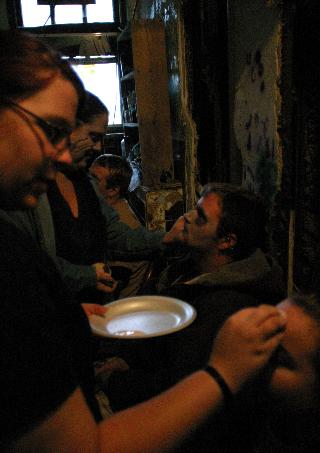The business of scaring depends on the person
Clinging to each other, members of the group inch their way through the dark hallway. Their hearts racing, fearing what is waiting for them around the corner. Pushing aside the hanging strips of black tarp, a woman with blood dripping down her face screams. The group screams back, falling onto the floor.
No one forced this group into this terrifying situation, in fact, they paid to get in.
Americans will spend $400 to $500 million dollars at haunted attractions this October, according to the Haunted House Association.
Jeff Stowell, a psychology professor, said this love of frightening events could because of genetic makeup.
Stowell said whether or not a person likes to be scared has to do with the amount of dopamine, a neurotransmitter that regulates emotion, the person needs to experience the feeling of excitement. Each person has a different type of dopamine receptor and the type of receptor determines how much the person likes to be scared.
“The differences in the form of those receptors between people may account for why some people do not get as much of a rush out of ordinary activities and then resort to more extreme thrill-seeking behaviors,” Stowell said.
Stowell said people who have those types of dopamine receptors enjoy bungee jumping, skydiving, driving fast or watching horror films as well as walking through haunted houses. Another reason some people like to be scared more than others comes from childhood experiences.
Stowell said some children who experienced more trickery than treats might have grown up to dislike scary situations. He said his brother is perfect example of this.
When Stowell was younger, he shared a room with his brother and enjoyed scaring him on a regular basis.
“One time, I hid underneath his bed when the lights were off, and I reached up from underneath the bed and grabbed him,” Stowell said. “Because of those experiences he developed a fear of the dark.”
Scott and Tanya Kelley, owners of Ashmore Estates, a haunted attraction in Ashmore, said just like there is a science to why people like to be scared, there is also a science to scaring.
“It’s the science of startling,” Scott Kelley said. “You have to catch a person when they do not expect something to happen. That’s when you can startle them.”
While startling is a key factor in scaring someone, Tanya Kelley said providing the unexpected is another factor.
“The thing to do about haunting is to make it wrong so people are not getting what they expect,” Tanya Kelley said. “If you have someone that is tall and masculine, stick them in a dress with a knife. It’s wrong. You do not expect that.”
Another time, Tanya Kelley said they had a worker dress up in a Snow White costume with no makeup or fake blood. The people waiting in line screamed and ran away from her. They were not expecting Snow White at a haunted house.
Finally, in order to scare someone, the Kellys said they have to overdo everything. For example, the nurses in their hunted house carry syringes with at least a six-inch needle on it. Standard needles are about half an inch long.
A study done by the National Retail Federations shows that 20.6 percent of consumers will visit a haunted attraction this Halloween.
But Scott Kelley said if people want to beat any Halloween fears they might have, they should not simply go to a haunted attraction; they should work at one.
He said it is only then that people can fully experience the science behind scaring.
Vicki Paisley can be reached at 581-7942 or at [email protected] .
The business of scaring depends on the person

Actors at Ashmore Estates haunted house prepare for their performance Thursday night by applying makeup and getting into character. (Seth Schroeder












































